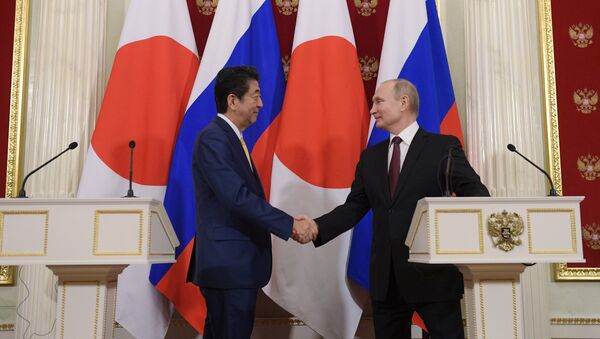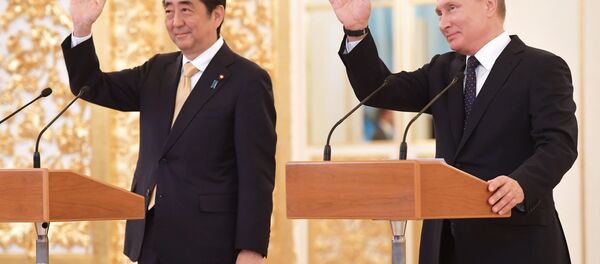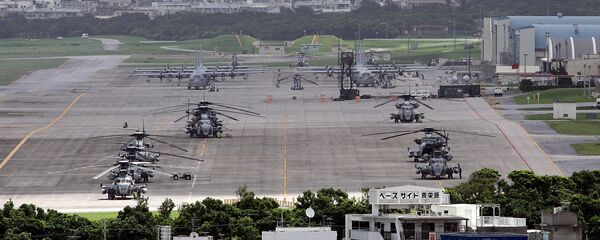On Tuesday, Putin and Abe held a meeting in Moscow. The talks followed a flurry of diplomacy between the two countries on the peace treaty issue and the launch of relevant consultations at the foreign ministers’ level earlier in January.
Following some three-hour talks on Tuesday, Putin said that the two countries had confirmed their interest in signing a peace treaty, stressing, however, that much "hard work [still] lies ahead to create conditions for reaching mutually acceptable solutions". Abe, in turn, noted that they had a frank exchange of views on the issue and instructed the foreign ministers to hold another meeting in February.
Sides Still Far From Mutually Acceptable Solution
According to Valery Kistanov, the head of the Center for Japanese Studies at the Institute of Far Eastern Studies of the Russian Academy of Sciences, the two leaders seem to have failed to reach substantive progress on the territorial issue.
"With regard to the territorial issue, by all accounts, no agreements have been reached on it or we have not been in the know of all things… If nothing has been said in this regard, then it means that the sides have so failed to bring the positions closer", Kistanov told Sputnik.
READ MORE: Russian-Japanese Peace Talks: Compromising on the Kurils
James D.J. Brown, an associate professor and the academic program coordinator for international affairs at the Temple University Japan Campus, agreed with the assessment that "the sides are far from reaching a resolution."
"From what we've seen so far, it appears that no significant progress on the peace treaty issue was achieved during Putin and Abe's latest meeting. It is also notable that Putin stressed after the talks that much hard work lies ahead to create the conditions for a mutually acceptable solution", Brown told Sputnik.
How Feasible Tokyo's Security Guarantees Can Be?
Commenting on the reports, Kistanov expressed strong doubt about the feasibility of this clause, citing the United States’ decades-long military presence in Japan and pending deployment of elements of the US global missile defence in the country.
"How, in principle, is it possible to include this provision in the [peace treaty] when the largest group of US armed forces abroad, including the 7th fleet, is stationed in Japan? And Japan continues to step up its military cooperation with the United States. The United States still views Japan as its unsinkable aircraft carrier, and Japan will not refuse to purchase the land-based Aegis systems it plans to host by 2025", the expert clarified.
Kistanov noted that the security guarantees could be a critical part of a peace treaty, but doubted that it would help to alleviate Russia’s concerns about the US military presence in Japan.
"The US military factor as a threat to Russia from the Far East will not go anywhere. Amid the current cooling of Russian-US relations, this is quite a serious thing [to be taken into account while signing a peace treaty], however", he added.
READ MORE: Japan's Abe Mulls Trading Peace Deal With Russia for 2 Kuril Islands — Reports
Brown similarly described the reported guarantees as "an interesting point of discussion" in light of Russian concerns about "Japan contributing to hostile actions" against the country, however similarly questioned their compatibility with Tokyo's commitments to its allies.
"It is also unclear about how this clause would relate to Japan's other security commitments. In particular, in recent years Japan has claimed the right to collective self-defence, meaning that it claims the right to use military force, not only to defend itself but also to come to the aid of allies when Japan's security is also affected. It would be necessary to work out how this commitment is affected by a clause promising not to engage in military action against Russia", the professor said.
Japan's 'Overly Ambitious' Expectations
Following the November 14 meeting of the two leaders, the Mainichi Shimbun newspaper even claimed that Abe was aiming to reach a "framework agreement" on the peace treaty issue with Putin by the latter's arrival in Osaka for the G20 summit in June.
"Given the current situation, it will unlikely happen at the G20. These were somewhat inflated expectations of the Japanese, and I think it has become clear to everyone, even the Japanese, that the case is likely to take more time, and will be further negotiated next year. It is difficult to say, but this year there will be nothing in terms of solving the territorial issues and signing a peace treaty", Kistanov said.
Brown similarly opined that such a breakthrough was unattainable within the next few months.
"This timeline has always been seen as overly ambitious and the developments of the last few weeks have confirmed that this is the case. Russia is evidently in no hurry to conclude a territorial deal with Japan and it seems unlikely that differences over this issue will be resolved in the next few months, if ever", he said.
Different View From Tokyo
Japanese experts, in their comments to Sputnik, seem to have been much more upbeat about the Putin-Abe talks.
Nobuo Shimotamai, a professor at the Hosei University and an expert in Russia-Japan relations, for instance, saw no critically "negative nuances" in Putin's remarks that much work was to be made by the two countries to reach mutually acceptable solutions.
"As usual the real talks are taking place tete-a-tete between the two leaders, and this time they spoke for 50 minutes… There were not many negative nuances in President Putin's remarks", Shimotamai told Sputnik.
READ MORE: US Actions in Japan Create Risks For Security of Russia, China — Lavrov (VIDEO)
Kazuhiko Togo, a retired Japanese diplomat and the director of the Institute for World Affairs at Kyoto Sangyo University, in turn, noted that "the remarks of the two leaders at this press conference had a lot in common."
"Probably, the two leaders avoid making some concrete statements on the peace treaty negotiations because media reports in both countries have been overheated over the past month, and they were concerned that some negative reactions would emerge and decided to calm down the situation", he suggested.
While commenting on the US possible stance on the talks, Shimotamai suggested that now "the era is different" and Washington would not create an obstacle on this path.
"The [Donald] Trump administration is [pursuing the] ‘America first’ [approach], and they have a good relationship with the Abe administration so I do not think there would be any objections. The head of the US military has spoken about this as well. However, explanation will be necessary so that anti-Trump Congress does not oppose it", he explained.
The expert also did not rule out that Japan and Russia could strike "an early agreement – whether specifically in June or not", if "the sides reach an agreement on where to draw the borderline".
Togo similarly opined that "there is obviously no need for the United States to oppose the treaty that enhances Japan-Russia trust", and suggested that "there is not much time left" until the accord was signed.
Among other things, the declaration stipulated that the Soviet Union would transfer the two disputed islands — Habomai and Shikotan — to Japan following the conclusion of the peace treaty. The two countries ratified the declaration but then Japan refused to implement these agreements, insisting on the transfer of all the four major islands of the Southern Kurils.
During talks with his Japanese counterpart, Taro Kono, on January 14, Russian Foreign Minister Sergey Lavrov stressed that the sides had confirmed their willingness to work on the basis of the 1956 declaration, "which means, first of all, the inalterability of the very first step — Japan’s recognition of the World War II outcome in full, including Russia’s sovereignty over all the islands of the South Kurils group".
Views and opinions, expressed in the article are those of the speakers and do not necessarily reflect those of Sputnik







